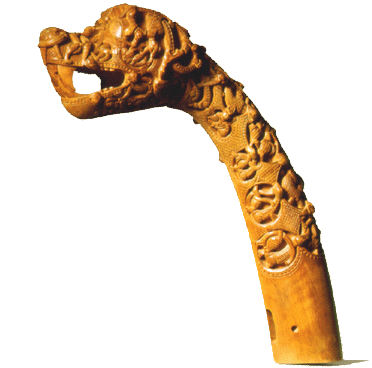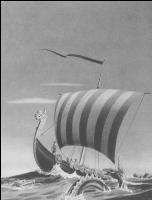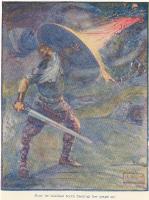
Preparing for Class:
November 8

Beowulf, pp.
131-213
- When Beowulf gets back to Geatland,
he's warmly greeted by his uncle, Hygelac. Who are the important characters
in the Geatish court?
- Hygelac asks about Hrothgar's
family, and Beowulf tells him about Hrothgar's daughter, Freawaru, who apparently
made a great impression on him. What does he say about her? How is her story
related to his observations (pp. 139-141) on the advisability of bartering
brides to keep the peace?
- On p. 145, Beowulf explains to
Hygelac why he was the one to survive in his recent battles; what's his belief?
- What does Beowulf do with the
treasures Hrothgar gave him? Why is this a reasonable thing to do? What does
Hygelac do in response?
- What does this last interchange
reinforce about the social code among the Geats and the Danes?
- Before going on into Beowulf's
final adventure, a good way to get reoriented might be to focus on the passage
on p. 149, where Beowulf's character is summed up, with four qualities being
highlighted by the poet. What are they? Why are they important virtues for
this society?
- When Beowulf becomes king, we're
told his principal duty is to be "warden of the land," which he does well.
What creates a threat to Beowulf's rule after half a century? In what way
is this last battle an act of Weird?

- Starting "long ago. . .", on p.
153, is a section of Beowulf known as "The Lay [or Song] of the Last
Survivor." It tells the story of a lost race of men all but one of whom died
in a fatal battle with their enemies. The only survivor lived to mourn his
people and to finally die, leaving his treasure to be found by a dragon, which
has guarded it for centuries. Read that section carefully, noting the mood
and the way in which the objects that survive the people are described in
such a way as to evoke a picture of their departed owners. Why is it appropriate
to tell the story as an opening to the final third of Beowulf?
- If you're familiar with The
Last of the Mohicans, you might think about parallels between that story
and "The Lay of the Last Survivor."
- As I mentioned in class last week,
it is common in a culture that buries treasure with the dead to evolve stories
designed to ward off grave robbers. In what sense is the dragon part of such
a story? Does the slave intend to rob a grave? If not, why is he punished?
Why does the punishment extend to the rest of the society as well?
- What changes does Beowulf make
in his fighting costume before he goes out to meet the dragon? Why?
- On p. 159, the reader is alerted
to the doom of both the dragon and Beowulf; what words does the poet use to
describe each? Why is it typical of this culture to suggest the outcome just
as the action begins?
- Just as excitement is building,
the poet slows us down with a lengthy account of how Hygelac and his son Heardred
died, despite Beowulf's attempts to protect them, and how Beowulf became king
in his turn. What purpose does this account serve?
- Beowulf himself then enters, with
eleven thanes and the slave who stole the dragon's jeweled cup. On p. 165,
we are told that Beowulf "was sad at heart, unsettled yet ready, sensing his
death." Before making his last boast, he too circles back on the past, recalling
the deaths of Hygelac's two older brothers, one killing the other by accident
and then dying himself in battle. On pp. 169-171, we find Beowulf's final
boast. What does he pledge to do as long as he lives? Why?
- Once the battle begins, Beowulf
strikes the dragon, but "the glittering sword, infallible before that day,
failed when he unsheathed it, as it never should have." The worst desertion,
however, is reserved for his picked band of thanes; what do they do that will
forever disgrace them?
- Who is Wiglaf, and what does he
have to say to his fellow warriors?
- Wiglaf then puts his words into
action in aiding Beowulf; how does the dragon greet him? When Beowulf strikes
with his sword, Naegling, what saves the dragon? Why is this ironic?
- Wiglaf cannot save the doomed
Beowulf, but he is able to ensure that Beowulf's last battle will not be a
losing one. Why is this so important to both him and Beowulf? How does he
assist Beowulf?
- In most heroic stories, the older
hero is accompanied at the end by a younger one who survives the battle. What
does this plot element add to the story? Can you think of any other stories
with a similar ending?
- On p. 185, Beowulf sums up what
he sees as the great achievements of his life. What are they and what does
it tell you about him that he mentions these particular things?
- What is Beowulf's final request?
Is it granted?

- Beowulf's last action is to give
Wiglaf Beowulf's own golden collar; why is this appropriate?
- On p. 191, we have an epitaph
for the dragon; what is his final destiny?
- When Wiglaf returns to his hearth
companions, still hiding in the woods, he calls down a curse on them; what
is the curse and what makes it a fitting punishment for their crime?
- Before we can bury Beowulf, we
have a final flashback, this time to the first of two Swedish wars, years
earlier, in which the Geats, under Hygelac, successfully defended their lives
and lands. Why does the messenger bring up the Swedish wars at this time?
- What do the surviving Geats decide
to do with Beowulf's treasure, won from the dragon? Why?
- On pp. 201-202, Wiglaf's messenger
predicts fate of Beowulf's people in the years to come. What is his prediction?
Why does it make sense from what we know about earlier Geatish history?
- The final pages of Beowulf
are devoted to a description of his funeral: be ready to talk about its details.
- What is Beowulf's epitaph?
Return to Daily
Readings and Assignments Page
Return to Home
Page





